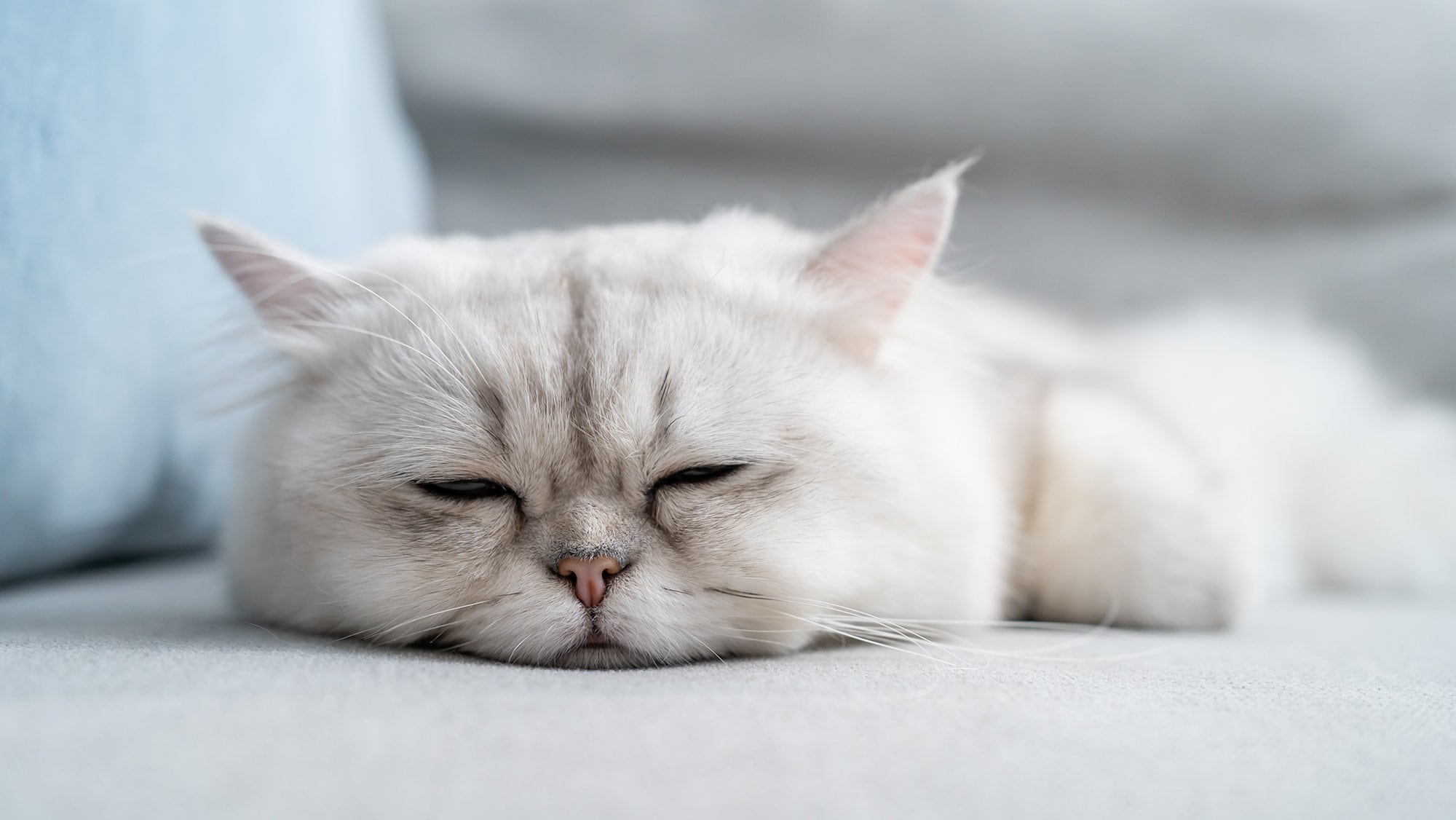Most cats sleep over 12 hours a day, with senior cats sleeping about 80% of the time. So when faced with a sleepy cat, how do you know if your pet is lethargic or just enjoying those cat naps?
If you are asking yourself, “Is my cat lethargic?” read along because this article is for you! We’ll look at what lethargy in cats is, what might be causing it, and what to do about it.
What Is Lethargy in Cats?
Cat lethargy is a noticeable decline in energy and a reduced activity level in cats. This might seem like you are simply looking at a tired cat. Tiredness is a temporary state, and within a few hours, your cat will be doing the cat zoomies again as usual.
However, the important difference with lethargy is that they are persistently not up and running after several long nice cat naps. This lethargic state could cause an abnormal decrease in appetite, vomiting, and weight loss in your cat because they are no longer as active as usual.
If you think your cat is lethargic, you can cross-reference the signs of a cat’s lethargy against their normal behavior. This way, you can determine if there are any differences in their activities and how much they are sleeping.
Causes of Lethargy in Cats
While a lethargic cat is normal when they are generally unwell or after vaccinations, it is not a natural constant state for any cat. A cat can be lethargic when they are in pain, overweight, have injuries affecting their bodily movement, or have a history of kidney disease and low blood sugar. The following are common causes of lethargy in felines:
- Illnesses and infections: Many cat diseases like digestive tract diseases, inflammatory bowel disease, kidney and liver disease, cancer, metabolic diseases, diabetes, heart disease, feline leukemia virus, and other viral infections.
- Side effects of medications like tramadol, opiates, and antibiotics: Even catnip can sometimes make a cat mildly lethargic.
- Nutritional disorders/deficiencies due to the presence of unhealthy ingredients or the absence of necessary ones.
- Age also plays a huge role in causing cat lethargy as your cat’s body deteriorates and sicknesses like arthritis set in.
- Neurologic disorders
Signs & Symptoms of Lethargy in Cats
What does lethargy look like in cats? Simply put, it looks like a constant state of tiredness alongside other signs, such as:
- Loss of interest in normal activities they used to enjoy
- Delayed or no response to external stimuli
- Decrease in activity levels
- Lack of energy in cats or low energy
- Not grooming themselves
- Abnormal sleepiness
While it is expected that your senior cats feel tired more often than they did in their youth, sudden lethargy in felines should be followed up with your veterinarian.
When to Seek Veterinary Care
Initiate a virtual vet visit with BetterVet if your tired cat has been less active for over two days or if they are also experiencing other symptoms, such as:
- Drooling
- Jaundice
- Poor appetite
- Severe vomiting
- Weight loss/gain
- Difficulty breathing
- Behavioral changes
These could be signs of more serious health problems in lethargic cats and should be followed by an immediate vet visit. Cat lethargy and many accompanying symptoms are nonspecific clinical signs that are seen in many illnesses, so be sure to report all of your pet’s symptoms to the veterinarian.
How to Treat Lethargic Cats
Lethargy treatment starts with a visit or consultation with your veterinarian. They will observe your pet’s medical history and most likely conduct a physical exam and basic lab work to find the underlying problem. Depending on their findings, they may prescribe:
- Dietary changes or supplements
- Medications or therapies
- Environmental changes
- Surgery
Home Remedies for Lethargic Cats
Home remedies are useful in managing the symptoms of lethargy and boosting energy levels in cases where the lethargic cat is being treated for the underlying condition after an accurate diagnosis by the veterinarian. These include:
- Natural supplements like catnip, B vitamins, turmeric, milk thistle, and coenzyme Q10
- Aromatherapy and essential oils like peppermint, ginger, rosemary, and lemon oil
- Removal of household toxins that might be harmful to their health
- Scheduling exercise and play activities into the cat’s routine
Ensure you implement these remedies with veterinary guidance for your pet’s safety. Some essential oils can be toxic to cats, so do not use them unless directed. If lethargy continues after trying these home remedies, drive your cat to the veterinarian immediately, or request in-home veterinary care.
Conclusion
A little extra sleep never hurts any cat, but a constantly lethargic cat is worrying. Check for signs of lethargy in felines accompanied by other symptoms like vomiting, neurologic problems, and metabolic disease if you notice feline fatigue. It could also be caused by underlying illnesses like liver disease. Seek professional veterinary help today if your cat starts acting lethargic or if your cat’s lethargy worsens.
Frequently Asked Questions
Can fleas cause lethargy in cats?
Yes, they can! Prolonged flea infestation on your cat can lead to exhaustion, and as a result, lethargy occurs.
Can antibiotics cause lethargy in cats?
Unfortunately, the answer to this is yes. A side effect of some antibiotics is lethargy. It should resolve once the medication is finished, though. You must still complete the course of medication.
Can ear infections cause lethargy?
Yes, a cat that has been suffering from an ear infection for a while will most likely be lethargic. See your veterinarian if the lethargy is followed by dehydration and poor appetite, as these are dangerous for kidney and liver health.
Can a diet change cause lethargy in cats?
Changes in their diet can cause cat lethargy when their nutritional needs are not met with the new diet, thus leading to nutritional disorders.
Can allergies cause cat lethargy?
Yes, allergies can cause your cat to be lethargic. Speak to a veterinarian for more advice.





